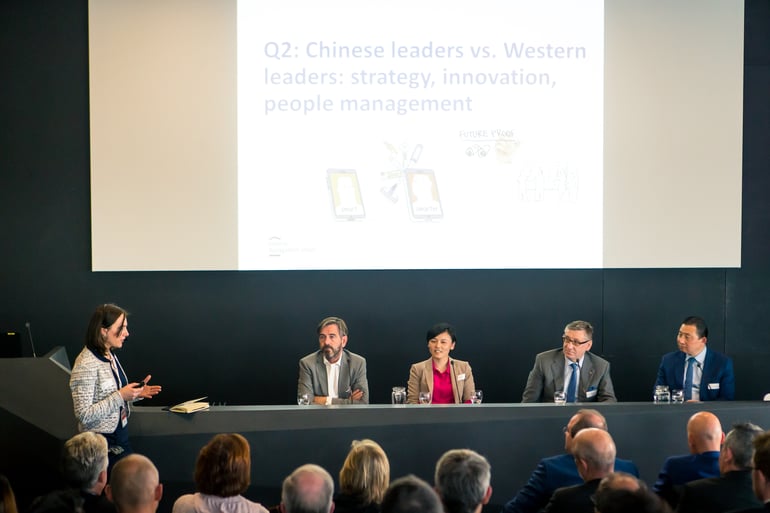
The LEAD-IN event which took place in the impressive surroundings of Antwerp Port House, was not only about doing business in China, but also, in keeping with the objectives of LEAD-IN, sharing inspiring leadership experiences about different leadership styles in the context of China and the West.
Antwerp’s Port Authority CEO, Jacques Vandermeiren, was fresh from the Chinese Belt and Road Summit and was the perfect host for the event. He opened the evening with some words about partnerships with Chinese companies and the ambitious development plan of the ‘One Belt One Road’ initiative. The panel consisted of Mr. Bo Ji (Assistent Dean Cheun Kong Graduate School of Business), Mrs. Charlene Wu (Chairlady of the Board – Anbang Belgium Holding), Mr. Bernard Vanhecke (Global VP Talent Management and Learning BEKAERT) and Mr. Dirk Coorevits (Managing Director SOUDAL).
To kick off the panel discussion, Dr. Bo Ji, Chief Representative for Europe and Assistant Dean of China’s top business school, shared his insights with regards to Cross Cultural Leadership. He took the audience on a journey to understand the main differences between human interactions in Western vs. Chinese culture. He compared high-context cultures, such as Chinese or Japanese, with low-context cultures (Swiss, German, Scandinavian, etc.). In the latter, communication is largely implicit, meaning that context and relationships are more important than the actual words, and therefore, very few words are necessary. It was a short but concise description of the differences and the influence on general leadership styles in China and the Western world.
"The Americans innovate, the Chinese duplicate and the Europeans regulate."
Both sides
The diverse range of lectures provided interesting insights from both sides: Chinese doing business in the western world and vice-versa. Cultural differences and leadership models also have an influence on business strategies. It is common knowledge that the Chinese style can be very efficient in carrying out vital tasks and getting quick results. They say that whilst the smart inventions may be coming from the West, the Chinese not only copy them, but also make them smarter by being more daring. Over here in the West, we spend too much time in the deliberation stage. More Western companies are thinking about moving innovation to China to yield faster results and to exploit the advantages of just one single market instead of the fragmented market in Europe. In China, business is done first and the legal framework follows. As they said: the Americans innovate, the Chinese duplicate and the Europeans regulate. There may be some truth in this.
A good formula for successful leadership for foreigners in China is to respect the ancient traditions and be as genuine as possible. Adopting the culture over there will require a couple of years’ practice as it is very difficult to grasp completely and authentically. Leadership also means not doing everything alone, so the local resources at hand should be used to complement one another. The foreign leader can focus on areas that are familiar and where he/she feels comfortable. A good balance of local and foreign individuals in leading positions will produce more successful results.
"Kaopu means trustworthy in Chinese and if you read the definition, you will not see a big difference with our Western definition."
Home blindness
Companies’ international experience and size make a clear difference in leadership and success in the other region. Home blindness is indicated as a phenomenon in Chinese as well as Western small companies, that do not have a lot of experience outside of their own home market. They see their leadership style and models as the best, which leads to a bigger gap between leadership styles.
Even bigger SMEs that export a lot can still fall into the same situations, and a lot of Chinese companies too, that even have a bigger home market and therefore have less incentive to internationalize. Good leadership between the two regions has to do with creating confidential relationships and an environment where talented people feel respected and can do their best work. Kaopu means trustworthy in Chinese and if you read the definition, you will not see a big difference with our Western definition.
Antwerp Management School has developed a program on this theme. Our ‘One Belt One Road’ Dialogues are a program for executives who are directly involved with international business development. The OBOR Dialogues aim to facilitate ‘translation’ of the OBOR objectives into concrete business opportunities for key players on both sides of the ‘Silk Road’.



